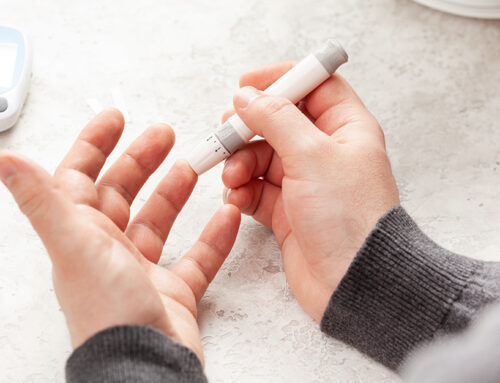Hormone Stress and Hashimoto’s
“Stress Could be Strangling Your Thyroid. Every time you have a thought, it is actively changing your brain and body for better or worse.”
–Dr. Caroline Leaf, Ph.D., Neuroscientist
Before we go into how important it is to manage our stress levels, I want to talk about how equally important it is to control your mental state, your attitude towards becoming healthier, and your life in general. Your mind can control your brain. And your biochemistry can change your hormones and emotions.
You see, I believe we are designed to be vibrant, curious, and engaged in life, to feel and express joy, and to exist in a state of positive well-being. I believe you feel the same way.
Although functional medicine has made significant inroads into managing chronic health conditions, this doesn’t mean functional medicine is omnipotent. There is still so much we don’t know. One piece of the puzzle we know is the role of our mindset. Some of the most excellent teachings on controlling toxic thoughts and emotions are by neuroscientist Dr. Caroline Leaf. She is a prolific writer and speaker, with numerous books such as Who Switched Off My Brain? Controlling toxic thoughts and emotions – is one of my favorites.
It’s not uncommon to see better outcomes in patients with a positive outlook than those who cling to an angry, defeatist, or negative attitude. We know that our mind governs our brain, attitudes, and perceptions about ourselves, our environment, and others, and these forces can have a powerful positive impact on our health. This is a substantial budding field called epigenetics, how our environment, food, people, and supplements impact our genes, emotions, and quality of life.
I know it is hard to stay positive when you feel like a” road kill” all the time, but spending even a few minutes each day doing positive self-talk, positive visualization, or prayer and meditation has been proven to improve the ability to cope and to heal.
Today, we will focus on how your adrenal glands could impact your emotions, energy level, gut, brain, thyroid, and sleep. The takeaway message is that if your labs are normal, but you feel “at the end of your rope,” your health is probably not normal. You are not well. Perimenopause and menopause are neither the end of the road nor Hashimoto’s and hypothyroidism. With the correct information and tools under your belt, this stage of life can be a glorious new beginning to your second act.
For best results, you must check your blood work and start loving yourself again. This is not narcissism; this is putting the air mask on first so that you can be supportive and a source of hope for others. You realize that no matter what others say, you are valuable, capable, and gifted with talents that your family, friends, and the world need. We are talking about grit. Remember? But how? By managing stress, practicing your faith, and being around people you love and who love you. Most importantly, by testing and not guessing! You are now equipped to check your lab work and see if you have a form of adrenal fatigue that impacts your reactions to stress. I have several programs designed to help you sort through the madness and help you get the answers you need.
Make Peace of Mind as Your Number One Priority, and Organize Your Entire Life Around It.
It’s not enough that you have an autoimmune disease and that every day can be different and some days much more challenging than others. No, of course not; now you must go out and face the day and the ongoing stress that inevitably comes along for the ride.
There are two types of stress: physiological stress (the stress placed on your body when not all of your systems are working properly) and everyday stress (mental and emotional stress) caused by things like a really long commute to and from work, managing your home and finances and getting dinner on the table before the kids start their homework.
Then, of course, life can occasionally hit us hard when things start tumbling down all at once; this is when we can become chronically stressed. This is stress on steroids. This chronic stress can cause chronic inflammation or other imbalances in your body and worsen your Hashimoto’s symptoms. This kind of stress depresses the immune system, alters our moods, and damages our professional and personal relationships. Prolonged or unremitting stress will take a toxic toll on the body, brain, mind, and spirit. Its ongoing assault wears us down, measurably aging — or “weathering” — our insides and outsides.
And, the crazy thing is, we “maladapt”! Often not realize the subtle changes in our energy levels, personality, or weight because we keep putting one foot in front of the other, many times just in survival mode.
- Chronic stress, whether physical (pain), emotional, or cognitive, strains our neurotransmitters and stress hormones and leads to imbalances in stress hormones, thyroid hormones, sex hormones, and neurotransmitters. Which system fatigues first in any given patient can only be determined by a thorough history and confirmed with laboratory testing. We are all individuals, each different genetically, and we fatigue our brain and body systems at different rates. This is both the challenge and the opportunity in an integrative healthcare approach.
- Adrenal imbalances are the most common health issues I see in functional health, and because healthy thyroid function is so dependent on healthy adrenal function, I want you to be empowered to check if this is one of the issues impacting your thyroid. You will learn how to nurture these worn-out workhorses back to health.
When you have chronic viruses, environmental toxins, and food intolerances, cortisol is triggered into the body from the adrenal glands and triggers the body to release extra glucose into the bloodstream. The additional glucose is used to increase energy production to adapt to the demands of stress. This is OK in emergency situations when mom lifts the car off of her child, but not every day, year after year, stuck in this pattern of just going to the grocery store, meeting with friends, and cooking dinner. This also explains why you may not eat a lot of sugar, but glucose came up high on your lab report. And why you feel overwhelmed so easily.
However, you have to go easy on yourself and be kind here. We are often stressed because we feel we are emotionally passionate and care so much about a situation or a loved one. By running lab panels, you can determine if there are biochemical deficits to determine if your over-reaction, or lack of reaction, is due to emotions or an over-reaction due to biochemical issues. You need to know that you can change your biochemistry through science-based supplements and lifestyle changes, which in turn will help you reframe the way you respond to stress in a more appropriate manner, in turn, sleep better, and have a normal weight!
Symptoms of stress, including anxiety, worry, low energy, headaches, stomach issues, insomnia, and a loss of sexual desire, can come on from fear and uncertainty, change and disruption, and your perception and attitude about the constant flux of life.
Symptoms of adrenal stress on your body can include:
- Fatigue
- Headaches, with mental stress, or afternoon headaches.
- Allergies
- Emotional roller coaster ride
- Shaky and irritable before meals or with delayed or missed meals.
- Craving for stimulants, caffeine, sweets, cigarettes
- Catching colds, weakened immune system
- Gastric ulcers
- Eating to relieve fatigue
- Transient spells of dizziness
- Varicose veins
- Hemorrhoids
- Insomnia
The truth is you can’t avoid stress, and everyone has different stress triggers. Everyone knows by now that daily and chronic stress can majorly impact your health and well-being.
It doesn’t seem like anyone can escape stress. Work stress and financial worries top the list for most, but if you are at a time in your life where you have kids in a costly college, a boss that is an exhausting pain in your you know, and you have taken on the responsibility for caring for an aging and/or terminally ill parent(s), well then you know what hardcore stress can feel like it. Stress comes in all shapes and forms.
Life stresses can also have a huge impact. Examples of life stresses are:
- The terminal illness and/or death of a loved one.
- A rocky marriage that ends in divorce.
- Constant financial worries, loss of a job or income.
- Increase in financial obligations.
- Getting married or remarried.
- Moving to a new home.
- Chronic illness or injury (hello!)
- Emotional problems (depression, anxiety, anger, grief, guilt, low self-esteem).
- Taking care of an elderly or sick family member.
- An unfortunate, traumatic event, such as a natural disaster, theft, or violence against you or a loved one.
- Being unhappy in your work, working long hours, threats of your work terminating through technology, lack of advancement, unsupportive colleagues, or being unemployed or underemployed.
- Pandemics, I don’t know how to do a pandemic, do you?
Sometimes, the stress comes from inside rather than outside. You can stress yourself out just by worrying too much about things. Yes, you can worry yourself sick.
Studies are being done about stress all of the time, and patients complaining of stress and fatigue make up more than 20 percent of all patient contacts in primary care, which amounts to 18 million physician visits annually in the United States (1,2). Seventy-five to 90 percent of primary care visits have been reported to be stress-related. Despite these statistics, conventional medicine is often at a loss regarding how to care for these patients.
What are The Adrenal Glands Supposed To Do, and How do They Impact Your Life?
Stress has always been a part of life, whether it comes from a charging saber tooth tiger a hundred thousand years ago or a truck running a red light this morning. When we are in a stressful situation, the adrenal glands kick into high gear, pouring hormones into our system. You’ve no doubt been in a stressful situation where you felt your heart race and your senses heightened. Your body was jacked with energy, strength, and focus, allowing you to flee, fight, or respond immediately to the threat. ( even if that meant slamming on the brakes to avoid the accident)
This is what the stress response is supposed to do. It can save your life. Or help you avoid injury during emergency situations. However, the adrenal glands haven’t had a chance to evolve in the age of all-night college cram sessions, job interviews, endless traffic, bombardment of social media, and the requirements of modern parenting. Our adrenals can’t tell the difference between the non-threatening yet stressful situation of waiting in line at the DMV and the truly dangerous situation of facing a rattlesnake on a hiking trail.
Healthy adrenal glands, two little glands that sit on top of your kidney that secrete stress hormones such as cortisol, norepinephrine, and epinephrine, are vital for optimal health and managing autoimmune diseases. The adrenal glands are one of the major players in a normal sleep-wake cycle and normal weight. Chronic stress can burn out our adrenal glands until they turn into dried-up pieces of toast. Cortisol plays a large role in balancing the immune system by telling the body whether to go into “stress mode” and increase immunity efforts.
When the adrenal glands release cortisol, the cortisol is accompanied by a small protein called cytokines, which are inflammatory messengers. Cytokines suppress the pituitary, in turn, the TSH signaling to the thyroid. Every negative thought about yourself or others is wreaking havoc on your immune system and modulating your TSH!
Your limbic system in your brain controls your emotions and is located next door to your pituitary, which releases TSH. This is why it is imperative to know the condition of your adrenal glands and govern your thoughts. Scientifically and biblically, we become what we think. We must lose the “should have,” “could have,” and regrets, forgive ourselves, and move forward into this mentally and emotionally competent new you.
What High Cortisol Does to Your Quality of Life:
There are several stages of adrenal fatigue, as first outlined by Dr. Hans Selye, “the father of stress,” in the 1930 ‘s. But for our purposes, high cortisol levels in the body reflect chronic inflammation, which leads to an eventual breakdown of the hormone system and the thyroid. This leads to you being unable to maintain a normal weight, being wired but tired, and an inappropriate response to st ss. Common causes of elevated cortisol and cytokines include chronic stress, post-traumatic stress disorder (PTSD), or hidden gut infections like parasites. Other causes of elevated cortisol levels include hypoglycemia, insulin resistance, and diabetes. Keeping blood sugar stable is an important factor in managing cortisol as well. Let’s turn these burnt-up little adrenals that look like raisins into luscious, vibrant grapes that will help regulate cortisol levels for many years to come!
Adrenal Fatigue
Those in the field of integrative or functional medicine are more familiar with the terms “adrenal fatigue,” “adrenal stress,” and “adrenal exhaustion.” These terms are often used to explain not only fatigue and stress but also a broad array of symptoms, including sleep disturbance, low libido, poor exercise tolerance and recovery, weak immune function, and brain fog.
How Our Bodies Manage Our Stress: The HPA Axis
Now, your body has a very effective system for dealing with stress; it is a system called the hypothalamus-pituitary-adrenal (HPA). Essentially, every time you get stressed and think negatively about yourself or others, a “danger” message is sent from the adrenal glands to your hypothalamus, where your pituitary gland is located, that signals TSH to your thyroid at the base of your neck to make T4, which triggers a cascade of neurohormones responses, including the release of glucocorticoids, such as cortisol, which increases circulating estrogen, and increases glucose.
Or to say it another way, when the stress level gets too high or chronic, it weakens the communication system between the hypothalamus and pituitary gland, which directs hormone production, including thy oid. It hampers the conversion of T4 to active forms of T3 that the body can use for energy and weakens the immune barrier of the digestive tract, lungs, and b in. Weakens the immune system and promotes poor immune regulations. This will increase your risk of Hashimoto’s or exacerbating it.
Our bodies are built this way to keep us out of danger. Faced with an emergency, our HPA axis’s reaction will help save your life. However, when the same stress response becomes a chronic condition, the HPA response can go into overdrive, increasing circulating levels of glucocorticoids, even when you may be curled up in bed, snuggling with your dog and bingeing on your favorite Netflix series.
If your blood test results show hypothyroid, high sugar, high cholesterol, or high T7 from your lab report, you might want to consider ordering an Adrenal Salivary Index kit from Diagnos Techs Labs. ( You can call our office, and we can make arrangements to have a kit sent to your home.)
This is a one-day, no-fasting saliva test that you do from the privacy of your home. You send in the specimens straight to Diagnos Techs Labs with your payment, and we can see what stage of adrenal fatigue you are in and other important variables impacted by the adrenal glands, like leaky gut, gluten sensitivity, and low progesterone, which can lead to insomnia.
It’s important to re-do the test, so we know we are on the right protocol, and on the right t ck. If your adrenals are not responding, we know we need to dig deeper to see what is sabotaging the adrenals. Is it a parasite reaction to heavy metal? Food intolerance? Low-grade chronic virus or bacteria?
What You Need to Do First to Get Your Adrenals to Respond;
You need to take care of these conditions before you can support the adrenals.
For anemia, check on your ThyroSisters blood panel for Total iron, ferritin, and TIBC, to see if any of the variables are low. When you are anemic, oxygen cannot circulate to the cells for any metabolic progress to take place, including adrenal and thyroid support.
Both high and Low Blood sugar are a stressor on the adrenal glands. Check the Glucose, HA1C, and the insulin levels.
Gut infections: Check the neutrophils for bacterial infection, eosinophils for parasite or allergy issues, and lymphocytes for viral infections. ( Check the ThyroSister Summary of Lab Indications Link for details.
Toxicity issues: if you have developed immune reactions to environmental compounds, like mold, heavy metals, or chemicals, these issues need to be resolved before the adrenals will respond.
Food intolerances and food allergies. It stresses the adrenal glands if you are eating food, causing an immune reaction even if you don’t have symptoms.
Feel free to reach out to our office for additional support if you are not responding to the protocols or need advanced help as your case becomes more complex. Don’t go it alone. We are here for you. Evidence supports concerns that prolonged HPA axis activation leads to chronic stress and maintaining high levels of circulating glucocorticoids, which promotes an inflammatory response and raises the risk of autoimmune thyroid disorders.
So, how do you know when you are on stress overload? Well, the symptoms I just spoke about are a sure sign, but it gets really confusing because when you have Hashimoto’s you may already have symptoms of low energy, insomnia, headaches and so on.
By now, you have heard me say it more than once. We can’t just go by symptoms alone, especially with our health at stake. You don’t have to guess about your cortisol or hormone levels and what they might do to your body, like exhausting your adrenal glands.
Please check our ThyroSisters Nutrition store, where you will find these key ingredients in formulas combined with easy product formulas.
The following are key Ingredients for Insulin Resistance:
The goal here is to support a healthy insulin response.
- Chromium
- Alpha lipoic acid
- Mixed tocopherols
- Magnesium
- Zinc
- Inositol
- Gymnema Sylvestre
Key ingredients for low cortisol and, low DHE, low adrenals:
The goal here is to support the adrenals and the sugar handling issues.
- Panax Ginseng
- Ashwagandha
- Holy basil leaf extract
- 2,000mg of phosphatidylserine
- Essential Fatty A ds. EPA and DHA from fish oil, taurine, or green tea extract.
- Licorice
- B vitamins
Key ingredients to support hypoglycemia:
- Healthy blood sugar balance
- Bovine adrenal gland
- Choline
- Bovine pancreas gland
- Inositol
- L-carnitine
- Co-enzyme Q10
- Vanadium aspartate
Little-Known Sources of Stress
Other factors not commonly considered when people think of “stress” will place just as much of a burden on the adrenal glands. These include blood sugar swings, gut dysfunction, food intolerances (especially gluten), chronic infections, environmental toxins, autoimmune problems, and inflammation. All of these conditions sound alarm bells in the body and cause the adrenals to pump out more stress hormones.
I think by now, you can understand how thyroid conditions such as Hashimoto’s thyroiditis are worsened by chronic stress, so learning ways to manage your stress is the key to better health. While stress alone may not cause a thyroid disorder, it may worsen your symptoms.
Stress can be even worse for those with a typical Type A personality. These types seem to set super high standards for themselves. They set up goals, reach them, and then create even higher goals before taking a moment to celebrate their achievements. They seem to drive themselves so hard that they don’t take a moment to break the. They will put ambition and achievements above everything else, even their health. The real problem is that some Type A women have to crash before they wake up because self-care is critical and perfectionism is impossible. Chances are, a Type A personality doesn’t do a ton of self-care because she has put most of her identity into her achievements, not herself.
Personality traits that include having a Type A personality also include a fear of failure, a penchant for perfectionism, spending a ton of time listening to negative self-talk, and being constantly tough on themselves.
To become a more calm and more peaceful person, you have to be really honest with yourself. Do you have a stressful personality? Are you a positive or negative thinker? What might you want to change about your own psychology to make living easier?
If you haven’t already, I encourage you to join my Facebook community, which is an exclusive community of hypothyroid, Hashimoto’s, and hormone-challenged women who no longer want to feel invisible, lazy, crazy, or finished. We have private discussions about everything from how to strengthen and lengthen your hair to a diet that supports a healthy digestive system and much more.
IMPORTANT NOTE: These supplements are food concentrates provided to upgrade the quality of your diet in order to support normal physiology and biochemistry. Always take your supplements with meals or food unless otherwise stated on the bottle. The supplements are NOT intended to cure any medical disease or to be consumed in lieu of medical recommendations.
Links to Thyrosisters.com Posts on Stress
- Chronic Stress and the Adrenals
- Workplace Stress
- The Link Between Stress & PMS with Autoimmune
- How Stress Really Harms Your Health
- Is Stress Making You Sick? Try An Adrenal Stress Test
- Stress Can Wreck Your Hormones & Cause PMS When You Have Hashimoto’s
- Did Stress Push You Off the Healthy Hashimoto’s Hormone Wagon?
- Is Undiagnosed PTSD Causing Your Chronic Stress?
- Adrenals Often Wrong Target with Chronic Stress









